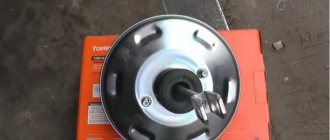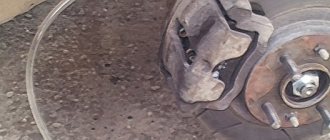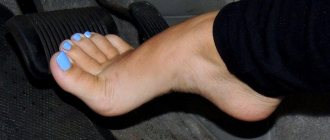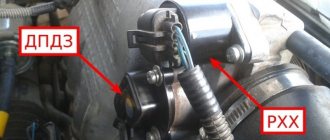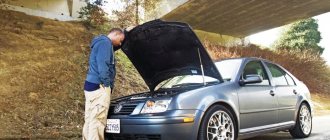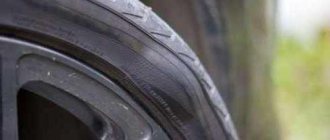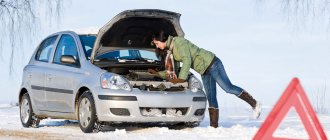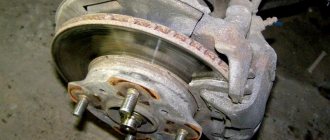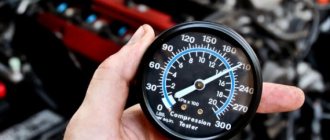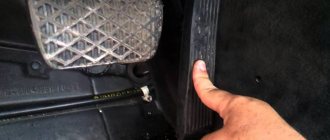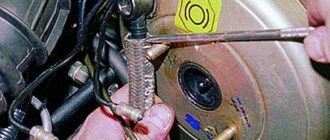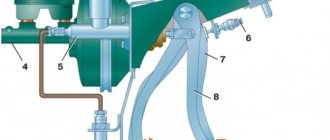A car's brake system without defects is the key to safe driving. The driver must be sure that when he presses the brake pedal, the car will start to stop with a certain intensity. Braking efficiency depends on a number of factors, but it cannot be achieved if there are defects in the brake system components.
Experienced drivers know the importance of timely replacement of pads and brake discs. But there is another problem that you may encounter: caliper knocking. If the calipers are knocking, it is necessary to identify the cause of the malfunction and eliminate it so that the brakes do not fail when the car is moving.
Continuation about clicks when braking. — Lada Granta, 1.6 l., 2013 on DRIVE2
So, in the last post I wrote that I observed slight knocking or clicking noises when braking lightly (from the rear).
I’m writing about the continuation of the story... But there wasn’t much of a continuation. I went and didn’t climb anywhere. I drove about 3 thousand km on vacation. I returned to work, and there my colleague told me how he changed the rear wheel bearings on his Priora (mileage 30 tkm, like mine) and after that he started... yes, yes, those same clicks when braking. Let me remind you that I also got them after an intervention (replacing the handbrake cables at the dealer under warranty). A colleague went to the service again, they took it apart, looked at it, and put it back together. The clicking seemed to go away, and then it started again...) He went for the 3rd time, again they didn’t find anything...)
Here I must say that by this time I had already FORGOT what was clicking in me! Those. My symptoms just went away or became very unnoticeable (I haven’t noticed them for several weeks now).
I still haven’t figured out the nature of the knocking, but it’s obvious that it appears after intervention (removing the drums or something else) and will most likely go away on its own and with my colleague (which I told him about).——
Added a month later The clicks appeared again. It’s a little annoying... I don’t want to climb. (although I may go to the dealer if they are clearly and constantly observed).
——
Recording another three months later.
There are no clicks. I forgot when they were... I didn’t do anything. I didn't remove the drums.
Mileage: 32000 km
www.drive2.ru
Hard or soft brake pedal: what is the reason and what to do
How the brakes work
The serviceability and correct operation of the car's braking system determines whether you can drive it normally or not. The law prohibits driving a car with broken or jammed brakes, even if it is a minor problem. This is still unsafe for both you and other road users.
To understand possible malfunctions and understand why the front brakes jam, you need to have an idea of the principle of their operation. The braking system in modern cars consists of brake discs or drum pads, which mechanically, if necessary, slow down the speed of the car. The system works like this: the brake pedal is pressed, the piston in the main brake cylinder moves, “adjusting” the brake fluid, which, in turn, passing through the lines, affects the brake cylinders of the wheels. They press pads equipped with a friction mixture against the discs or drums. This leads to braking.
In addition, the brake system is equipped with an expansion tank for brake fluid and a vacuum booster, thanks to which you only need to press lightly on the pedal. There are quite a few car models equipped with a special electronic system (ABS) that prevents the wheels from locking during braking.
We recommend
Wheel bearings
We continue to study why the rear right wheel knocks when driving. Whether it’s the 9th Lancer or a VAZ, it doesn’t matter – the bearings make the same noise when they wear out. But the sound is very insidious. At first it will be barely noticeable. If it is not detected in time, the broken holder may simply jam the wheel at speed. Also, knocking noise occurs if the bearing is not tightened properly. To diagnose this, just lift the rear wheel on a jack and shake it from side to side.
Note! The bearing should not be over-tightened. You need to leave a small gap in case of thermal expansion
Minor play is allowed. But if the wheel wobbles, this already indicates a problem.
Expert answer
I had a similar knocking sound that sounded like "DUK-DUK-DUK". The sound is the same as in the video, only weaker.
If you have exactly this sound, then it is almost 100% that the brake pad is clinging to the drum. It remains to find out why this happens.
Hello fellow clubbers, while driving, when you press the brake from behind, you can hear a knock knock knock knock on the right side, what could be the problem? Can you tell me if anyone has encountered this? Thank you all in advance.
Added after 56 seconds Can the drum work out?
Hello fellow clubbers, while driving, when you press the brake from behind, you can hear a knock knock knock knock on the right side, what could be the problem? Can you tell me if anyone has encountered this? Thank you all in advance.
Added after 56 seconds Can the drum work out?
take the drum off and take a look. maybe the pads are screwed. The spring may have broken. the sooner the better, otherwise there may be a wedge
I also noticed a knocking sound in the brake drums when pressing the brake pedal, BUT with the handbrake pulled out. I seem to have changed the pads recently (last year) and the brake cylinders too
no way, I noticed it yesterday. When you release the handbrake there is no knock. I'll take a look sometime.
No, I have it while driving, when you approach a traffic light and press the brake and this knocking noise occurs.
The brake cylinder is bad, a friend had the same problem
which one, or the main one or whatever the vacuum cleaner is. Tell me what exactly he changed, and what exactly.
I changed both brake cylinders on both sides and changed the brake pads at the same time.
On the new car there was a similar knock-knock-knock when braking on the left rear wheel. We disassembled the drum, everything was fine there, put it back together, adjusted the handbrake, everything stopped.
And I had the same thing on the new one. Car with ABS. There was also a knock-knock-knock noise when braking on the left rear side. I went to the service station. We went for a ride with the master. Then they opened it. They looked, shrugged, and put it back together. The knocking sound disappeared. Now the mileage is 57 thousand. The knocking noise no longer appears.
This happened to me when braking on a 6. The rear wheel made knocking noises (like knock, knock, knock) in time with the rotation of the wheel. An autopsy showed that the wheel bolt, which was too tightened, was touching the side of the brake pad with its end. There was a fresh impact mark on them. It was cured by shortening the bolt on sandpaper by 2mm.
Did you by any chance put a casting bolt in the regular wheels?
I got the same crap. I took it to a service station and they installed the rear camber plates. Well, there’s something with the front end, but that’s not the point. Now, when braking at speeds less than 50, there is a knock-knock-knock from behind. At lower speeds the sound is louder. What the hell? Today I want to look at the service station. Let them dig. But to speed up - where to look??
Write back later how they do it and how.
Then the knocking noise could be either loose pads or something foreign.
1. Does the car have ABS? 2. At what pressure? Those. when braking “to the floor” or during normal full braking? 3. When making such sounds, does the pedal hit your foot or vibrate? In general, how does it feel on your leg?
1 there is no ABS on the car 2 the pedal crunches every time you press it 3 it’s just a nasty crunch
Added after 1 minute in 571oa, I blame the springs. I think when installing the spacers, the service stations could have messed up. Yesterday there was another knock-knock noise when braking. but not with everyone. Surprised. I'll take a look at the weekend. PS No ABS.
and I’m sinning either with the GTZ or with the vacuum cleaner. or even brake cylinders.
For those who have a knock from the rear, which is reflected in the pedal, and the car does not have ABS, then look at the geometry of the brake drums - even a small oval will give such an effect.
Silent blocks
Whether it is a beam or an independent suspension, in any case, silent blocks are present in the rear suspension. They are designed to reduce vibrations and shocks that are transmitted to the body during operation of the chassis. The service life of silent blocks varies and ranges from 100 to 200 (and higher for a semi-independent beam) thousand kilometers. If these elements are worn out, play occurs. But even a slight play can cause a knock, which will be clearly audible inside the car. As with shock absorbers, this sound will increase on rough roads. How to solve a problem? There is only one way out here. This is replacing silent blocks with new ones. On some cars they are changed separately, on others - together with the suspension arm. After replacement, the sound disappears completely.
Looking for the root of the problem
So, what causes such a characteristic ringing? The reason lies in insufficient pressure of the pads to the discs. As a result, a gap appears between them. On bumps, the pads vibrate and involuntarily come into contact with the surface of the disc.
This is what causes the haunting sound. What is noteworthy is that from the street it looks more like a ringing sound. And dull blows are felt inside. Sometimes this indicates a problem with the shock absorbers or ball joint. But don’t rush things and sort out the suspension. Perhaps your brake calipers are just rattling.
Caliper piston jamming
During braking, the fluid presses on the piston. However, it gets stuck in the cylinder and remains in this position until an increase in pressure pushes the piston out of it. When this happens, it hits the pads with force and presses them down - this is the reason why you hear a knocking noise from the front when braking.
To correct this situation and get rid of annoying sounds, just remove the caliper and remove the piston. Then its condition is visually checked, and the surface of the cylinder is inspected together with the piston. If traces of corrosion are found during the inspection, the cylinder must be cleaned, and it is recommended to replace the piston.
Wear of guides and bushings
When the guides and bushings wear out, a knocking noise appears when braking, as well as on uneven road surfaces. In the most advanced cases, the pads rattle throughout the entire movement. To solve the problem, you need to purchase a special repair kit. It includes 2 boots, 2 guides, 2 bushings and special lubricant.
Instructions for eliminating pad knocking due to the guides are given below.
- Unscrew the two caliper guides.
- Replace the bushing and reassemble everything in reverse order, using the elements from the repair kit.
Knocks in drum systems
In such mechanisms there are a sufficient number of places where knocking from the rear can occur when braking. Often this mechanism is a parking brake. Since the parking brake cable splits into two parts under the car, it may well be that one of the parts has become loose. The mechanism is weak, and when the driver presses the main brake pedal, the pads of the drum system separate. There is play between the pads and the parking brake thrust bar, which is the cause of the knocking noise.
- Why does the car jerk when accelerating?
The distribution part also knocks frequently. If at least one of the cables is not tensioned enough, then the bar will vibrate and the driver will hear a knocking noise in the rear wheel when braking. Another reason is the pad retainer. If it comes out of its seat, the block will move - this will provoke a blow to the drum. Rarely, vibration can be caused by a loose rear wheel bearing. But more often it's just noise. It appears at low speeds when braking. Another quite rare cause is long wheel bolts. A longer one catches during braking. The problem can be solved simply by replacing the bolt with a short one.
In models built on the popular B0 platform, the rear mechanisms begin to creak during operation. The reason is simple - the brake pad rubs against the shield. Diagnosis is simple - remove the clamp, then remove the block. Scuffs will be visible to the naked eye. Treating this situation is also very simple - the damaged area should be cleaned and lubricated with grease. And then the sounds will disappear.
Build error
If the pads begin to rattle after overhauling the brake system or replacing them, this may indicate an error occurred during installation work. At the same time, one should not exclude the risk of installing low-quality consumables, which cause extraneous sounds.
The most common error during assembly is poor fixation of the inner pad by the petals in the piston. In this case, you need to get it out by disassembling the caliper. Next, you should bend the petals further and mount everything in place.
Rotate drum or rear knock when braking. — Lada Kalina Hatchback, 1.4 l., 2010 on DRIVE2
I recently went to Yoshkar-Ola and back, the train went smoothly, except for the fact that the windows were constantly closing. It seems that the new heater radiator is still leaking. We'll check.
The next day after the trip, a knocking sound appeared under heavy braking. For a long time I could not understand where it came from. It seemed like it was in front. In addition, I recently changed the disks, I was afraid that one of them was cracked.
I decided that I needed to look at the hole.
Unfortunately, it was not possible to do this in the near future. I’m sorry, I rode like this, I didn’t drive too hard, I didn’t slow down too much.
One fine day before work I decided to look behind the rear wheel, fortunately the casting is now there and there are gaps, I don’t know why, something prompted me to do this.
And I saw the following:
The engine starts and stalls: possible causes and solutions to the problem
Naturally, it’s immediately in my head to change it urgently. God forbid it jams on the move.
I went to the store. I thought for a long time about what to buy - aluminum or steel. I studied the issue, decided not to make it heavier and bought an aluminum factory, new pads, a set of new springs, and at the same time decided to replace the spark plugs.
Unfortunately, there is no replacement process, I did it in a hurry and alone.
1. Unscrew the resonator shield2. Remove the rubber holder for the muffler 3. Release the handbrake4. Remove wheels, drums5. Replace with new ones naturally.6. Adjust and tighten the handbrake
7. Return the rubber band and resonator shield
I rolled up one pin holding the shield
When changing the spark plugs, the thread around one well, fixing the ignition coil, turned. I don’t understand how, I didn’t even apply any force.
Well, the worst thing is that in the outermost cylinder there is a spark plug in oil on top.
I'm sinning with the valve cover gasket. We'll look at it in general, the machine doesn't let you get bored)
That's all for now, at least for today)
Good luck to everyone on the road)
www.drive2.ru
The mount has come loose
This happens, but quite rarely. A common reason is traveling on poor quality roads. Vibration can cause bolts to become loose and unscrewed. Usually, this happens soon after a repair affecting the caliper. In this case, you or the master simply did not tighten the bolts. For prevention, always pull fasteners with a certain torque when assembling.
This will save you from problems. To eliminate this knocking noise, simply tighten the bolts. If one of them is lost, make sure it is not broken off and screw on a new one. The broken bolt will have to be drilled out.
Conclusion
. There are quite a large number of different mechanisms near the wheels. They periodically fail. Therefore, the question of what to do if the calipers are knocking is not uncommon. In many cases, this is a design feature that will be quite problematic to eliminate. But it is still quite possible.
Summary
The braking system is the basis for vehicle safety. If the slightest problem occurs in its operation, you must immediately look for the problem and fix the problem. In fact, there are not so many reasons. In addition, everything can be much simpler - for example, a knock in the wheel when braking occurs due to a loose caliper mounting bolt.
I read all the topics, I have slightly different symptoms. Need some advice. In general, this started a long time ago.
If you accelerate sharply and then brake quite sharply, there is a knocking sound, if you do everything smoothly, then only sometimes there is a knocking sound.
This knock is not dull or loud, it’s something in between, it looks like someone hit the concrete floor with a hammer in the next room, with a force of about 6 kilograms, but a little louder. (I hope I described it clearly, I’ll try to record this sound over the weekend)
At first I sinned on the shock absorbers of the stub struts. But after changing everything around a month later, the knocking became even stronger, now it really bothers me. So it seems like I have my hands on it myself, and I can see for myself what is there and how it is before going to the service center.
In general, now sometimes even when starting off, a knocking sound appears. It feels like it could be one of these: - The front wheel pad is loose - The caliper is loose on the hub - The suspension arm
I exclude protection, because I've already checked. The stub struts are replaceable, and they don't play a role when braking.
We recommend watching:
- How does a disc brake caliper work?
- Why do the pads wear unevenly?
- How to design a front caliper
- Why does the brake caliper stick?
- How to lubricate the guides of VAZ calipers
- Wheel rim landing parameters
About the difficulties of diagnosis
In addition to the braking system, it is worth checking for faults in the wheel drives - this is indicated by a knock in the front suspension when braking. This is a fairly common phenomenon that motorists encounter. Experts say that often the culprits of suspicious sounds can even be the steering system and engine mounts. This is why fault diagnosis is a very complex process. One of the typical features of the occurrence of sounds when braking is that knocking appears only in the pedal, which is depressed halfway. If you press it to the floor during intense braking, then the extraneous sounds will disappear. Car owners often write on forums that this sound can be heard when driving at low speeds, and also at medium speeds. At high levels - less often. In most cases, it is impossible to hear anything as long as the brake mechanism is cold.
Another point that complicates diagnosis is the frequency with which knocking occurs when braking in the front or rear wheel. It can be heard for some time, then disappear completely and appear again after a while. Nowadays, many cars are equipped with ABS - sometimes the malfunction may lie in it. But this is far from a fact. Even self-diagnosis systems are not able to detect errors in the operation of the anti-lock braking system.
Causes of knocking in brake mechanisms
Let's look at the mechanisms.
One of the most common causes of knocking is wear of the seats under the caliper guides of disc mechanisms.
At the same time, play in the caliper appears; when braking, it begins to vibrate, which results in a knocking sound.
The problem is solved quite simply - the guides are replaced.
A knocking noise may also occur due to a jammed caliper piston. When braking, the fluid begins to put pressure on the piston, but it stops in the cylinder until the increasing pressure of the fluid pushes it out of the cylinder.
In this case, the piston hits the pads and presses them, this impact is the cause of the knocking.
In this case, it is necessary to remove the caliper and remove the piston to assess the condition of its surface, as well as the surface of the cylinder.
If traces of corrosion are detected, the cylinder mirror must be thoroughly cleaned and the piston itself must be replaced.
Another reason for the knocking noise lies in the fact that the brake disc has “begun” due to overheating, and it bends.
During braking, the pads, reaching the bend, hit it, which causes the knocking sound.
At home, it is almost impossible to check the disk for bending without the appropriate one.
However, there are exceptions.
However, an indirect sign of this malfunction can be uneven wear of the pads.
As for drum mechanisms, there are also plenty of places where knocking can occur. One of these is the parking brake mechanism.
Since under the car the mechanism control cable is divided into two parts leading to the mechanisms, it is quite possible that one of the parts of the cable has become loose.
Because of this, the handbrake drive mechanism is in a weakened state, and when you press the brake pedal in this mechanism, the pads diverge.
There may be a play between them and the parking brake stop bar, which leads to a knock.
Alternatively, the distribution bar, from which the cables extend to the mechanisms, can knock on the body. If one of the cables is not tensioned, this bar may vibrate and hit the body.
The knocking noise can also be caused by the pad retainer. If it pops out, the pad will be able to move, causing it to hit the brake drum.
As for ABS, checking whether it is the cause of the knock is quite simple - you need to pull out the fuse that is responsible for the operation of the ABS. Each brand of car has it in different places, you need to look at the diagram.
In this case, this system will stop working, but the brake mechanisms will work. If after this the knocking noise disappears, there is a problem with the ABS and you should contact service.
Now let's look at other elements that can cause knocking when braking. One of the reasons may be a banal loosening of the wheel fastening. In this case, it will play during braking and hit the hub.
You should also check the hub itself for play. If the wheel bearing is heavily worn, knocking noises may occur when braking.
The next component of the car that should be checked is the suspension.
Worn silent blocks and bushings may be the cause of this problem. Wear of the silent blocks of the steering mechanism can also lead to knocking noises.
Finally, you should check the engine mounting. Loosening it on one of the cushions can easily cause a knock.
In general, when knocking noises appear, you should start checking from the brake pedal and go to the mechanisms. Moreover, you need to inspect and check carefully. Even a small amount of play can lead to this problem.
Along the way, you should also evaluate the condition of all elements of the car located near the hubs or connected to it.
Discs
Failed discs can also cause pads to knock. As a result of intense braking, the metal heats up. When driving through a puddle, water entering leads to deformations. Disc beating occurs. In this case, the knocking of the pads directly depends on the speed of the car. Elimination of runout is possible by boring, but provided that the deformation is not significant and the thickness of the disk is sufficient. Otherwise, it needs to be replaced.
The use of low-quality discs leads to their delamination. This causes damage to the pads and their knocking. The problem can be fixed only by replacing the disks with high-quality ones.
Brake systems
This is one of the key safety factors. It is with the help of brakes that the driver can reduce the speed of the car until it comes to a complete stop. There are several types of systems. The most common option is with a hydraulic drive. Here, the force from pressing the pedal is transmitted using brake fluid to the actuators. They are on the hubs. As for the brake mechanisms themselves, two types of solutions are used in cars. These are the popular disc brakes today and the older version - drum brakes. In the first mechanisms, the pads interact with a disc mounted on the hub. As for the second, they are located inside the brake drum. The deceleration process is carried out due to the fact that the pads are unclenched and pressed against the internal planes of the drum.
Drum brakes are a rather old and archaic solution. But they are still widely used on budget cars. A parking brake is also implemented using drum brakes. Thus, there are disk systems in front, and drum systems in the back.
Pads
Often, a metallic grinding sound is added to the knocking. This happens when the lining on the block has been removed completely. The knocking does not come from the caliper itself, but from the pads. The repair consists of replacing the pads. If you ignore the problem, your braking performance will be significantly reduced. But that's not all.
Having worn down to iron, the pads actively wear down the brake disc. A hundred kilometers in this mode and it will simply “cut off”. And you will have to buy a new disk at the store. It can also easily push out the working cylinders. This is fraught with jamming. The most common problem in this case is brake fluid leakage.
Blog - Hello comrade!
Many people are faced with a fairly common problem: caliper rattling. The main symptom is a metallic rattle, which disappears if you lightly press the brake and mainly appears on cobblestones or similar roads and is also clearly audible when you get into holes. The sound itself can be either sonorous or more dull. The main reason is the broken holes for the guides due to untimely maintenance. Although once a year it is necessary to check the presence of grease on the caliper guides, as well as the condition of the rubber boots.
How to eliminate knocking calipers
If the knocking has just appeared recently, an inspection of the calipers may help, that is, lubricating the guides with high-quality lubricant and checking the boots.
It is important to use high-quality lubricant special for guides. It is not recommended to use copper, ceramic or hub grease. These types of lubricants will jam the caliper guides under certain conditions. The optimal lubricant for guides is SLIPKOTE 211 DBC or similar. If the necessary lubricant is not available, as a last resort, use blue lubricant for the hubs, up to 170 degrees; without sudden braking, such lubricant will work normally. In principle, there were no problems with it on the Starex bead; the anthers did not swell.
